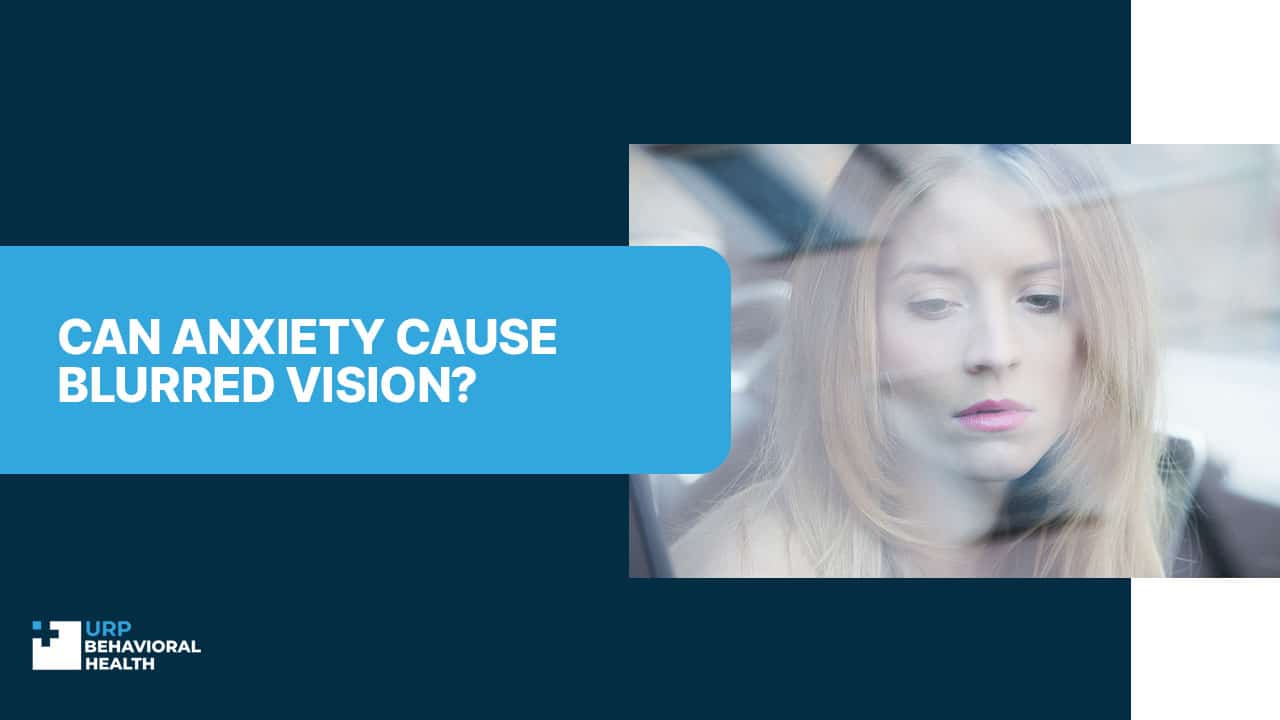
Can Anxiety Cause Blurred Vision?
Anxiety is quite a common feeling unless it becomes the source of mental health issues. It is defined by the American Psychological Association as the feeling of tension and worry [1]. In people who constantly experience anxiety, this feeling can come into a kind of chronic state which is categorized by scientists as a group of anxiety disorders.
At once, what causes anxiety issues? Along with genetic predisposition, anxiety is greatly catalyzed by stresses of various origins. As a result, patients with anxiety often feel dizzy and restless, they suffer from low concentration and energy, and stress as the triggering factor for anxiety, can lead to physical impairments.
Although typically the most relevant physical symptoms of anxiety disorders are heart attacks and increased heartbeat, high blood pressure, fatigue, and numbing limbs, in some patients, eye diseases also occur with blurred vision among the most common of them. How can anxiety affect vision and how stresses are related to the issue? This article may clarify this question to you.
Can Stress Cause Blindness?
Vision loss is among the most frightful issues. At once, you probably see in the literature or media references to cases when a person has lost vision due to extreme stress. That’s not fiction, as scientists today state that stress is at once a consequence and a cause of eye diseases and vision loss [2].
As a trigger for psychosomatic processes in the body, stress boosts the production of the ‘stress hormone’ cortisol, which negatively impacts the brain and vision. With the elevation of cortisol levels, the sympathetic nervous system becomes imbalanced and vascular dysregulation occurs. One more thing to consider about how stress boosts vision issues is that during being distressed, our body also produces higher levels of another hormone, adrenaline, which increases pressure in the eyes.
As a result, stress can cause vision problems and diseases like glaucoma or optic neuropathy, and they, with time, can grow into a more serious problem, namely, blindness if not treated timely.
Don’t wait - confidential help is available right now for you or your loved one.
Other Ways Stress Affects Vision
Besides the ophthalmology diagnoses we mentioned, constant stress may cause other vision problems, like as follows:
- Eye strain that makes a patient feel discomfort and minor eye pain with the feeling of eye swelling.
- Eye floaters which occur due to the high tension a person experiences at the moments of stress. These are imaginative spots or dots floating around a patient when they look at something.
- The syndrome of dry eyes when eyes are constantly swollen, red, and irritating.
- Constantly wet eyes also may be a result of continuous stress.
- Blurred or shaky vision is also among stress-related consequences.
All these states are the results of how stress affects your vision. At once, they occur only in specific conditions like constant and continuous stress factors and predisposition to certain eye diseases.
Can Anxiety Make Your Vision Blurred?
Anxiety is deeply related to stress. It is normal when we feel anxious under the pressure of stressful factors. Thus, it is logical that anxiety and blurry vision are correlated. Today, this correlation is a matter of multiple studies and emerged with the advent of a specific section of ophthalmology, psychosomatic ophthalmology, which focuses on vision issues related to stress and anxiety.
If talking directly about anxiety, it is, like stress, both a cause and a consequence of vision issues because constant and severe manifestations of anxiety cause vision problems including blurred vision, distorted vision, seeing stars or flashing spots, diminished peripheral vision, or tunnel-like sight due to an imbalance in the sympathetic branch of the ANS because of increased cortisol and adrenaline levels[3].
At once, blurred vision and other vision issues when they occur suddenly, increase the feeling of anxiety in patients creating a vicious circle.
The good news is that blurry vision from anxiety is not irreversible. In most cases, after the anxiety attack is over, your vision returns to a normal state. If blurred vision occurs once or twice in your life, it’s quite normal and doesn’t require medical help to be solved. If such issues repeat regularly, it is better to consult both with psychologists or psychotherapists and with optometrists to ensure vision issues are not progressing.
How to Know Whether Anxiety Is Causing Your Blurred Vision
Although blurred vision is not a mandatory symptom of an anxiety attack, you can decide that it happened due to your feeling anxious by considering the following other symptoms:
- Blurred vision caused by anxiety is always temporary, and it perishes once you feel safer and relaxed.
- To ensure your blurred vision was triggered by anxiety, check your feelings. If you feel worried and concerned, you experience intensive heart beating and breath issues, you feel the blood pulsing in your veins, and at once you feel cold or fever, you feel fear and restlessness, these are symptoms of the anxiety attack.
Reach out today and let us create a treatment plan designed around your needs.
How to Treat Stress-Related Vision Problems
Stress-related vision problems can be treated successfully. Moreover, in most cases, your vision loss, blurred vision, or distorted vision may vanish as soon as their trigger, namely, stress, is reduced.
Thus, the most effective way for stress-related vision problem mitigation is the combination of ophthalmology and psychotherapy. Ophthalmologists may select the most effective treatment methods for the reduction of eye-related symptoms, for example, special vision therapy to alleviate the discomfort, eye hydration and medications, according to the results of an eye exam. At the same time, the help of mental health specialists is essential because the main aim of the treatment is to remove stressful factors, including anxiety. The idea is to turn back vision changes with anxiety and stress by applying special techniques and methods.
- The changes in the lifestyle are the first step to take. When you manage your life and include regular exercising, a healthy diet, and regular sleep, your vision issues may be relieved. At once, if your vision is damaged by stress-related factors or anxiety, you should exclude all stimulants from your life as they can make things even worse.
- Relaxation techniques. Specialists may offer a patient to try relaxation techniques, deep-breathing methods, grounding methods, and meditation practices to relax the body and eyes and mitigate discomfort and vision issues.
- Psychotherapy should also be applied especially its cognitive-behavioral methods and counseling with a focus on the increase of optimism and mindfulness in patients. Since the patient has managed to relax and calm down, their vision and anxiety symptoms may be reduced.
This combination is the most effective for blurred eyes and eye strains caused by anxiety and stress.
Conclusion
Stress deeply affects all systems in the human body, and vision is not the exception. You may experience multiple stress-related vision problems which can impact one or both eyes, often stress causes temporary blindness. Anxiety as a condition triggered by stress also has vision-related effects. Some patients with anxiety may experience blurred or distorted vision. Others may feel their eyes sensitive to light or movement. Eye strains are also quite common in patients with anxiety attacks or diagnosed anxiety disorders.
In any case, you can get a remedy for these issues, and this remedy should impact both eye-relieving therapy and anxiety-reducing therapy. Such an approach supposes coordinated work of ophthalmologists and specialists engaged in mental healthcare. In URP Behavioral Health, we provide a comprehensive approach to anxiety issues and anxiety disorders treatment with a deep focus on the mitigation of anxiety symptoms and consequences, including those affecting your eyes. With the help of special relaxation techniques and psychotherapy, you can return your clear vision.
Contact our admissions team now to begin your path toward a brighter future.
Resources:
- https://www.apa.org/topics/anxiety
- https://pmc.ncbi.nlm.nih.gov/articles/PMC5972137/
- https://pmc.ncbi.nlm.nih.gov/articles/PMC10607452/
















